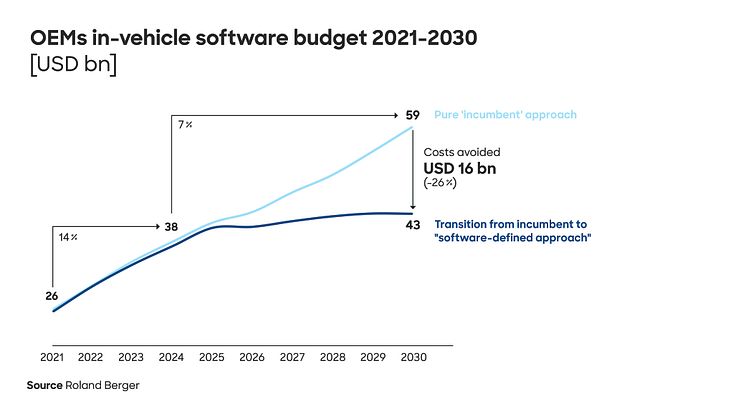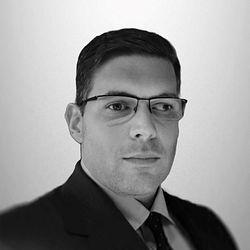
Press release -
Roland Berger study: Automakers could save USD 17 billion a year from 2030 by outsourcing software development
- OEMs mainly custom-develop software themselves, some developing as many as 90% of the programs they need in-house
- Development spending has risen 14% per year since 2021; action to keep it under control is needed in view of stagnating budgets
- A third-party software market for the automotive sector would cut costs, foster innovation and bring the industry closer to the era of the software-defined vehicle
Munich, October 2024: The vehicle of today is increasingly turning into a computer on wheels. Automakers (OEMs) or Tier 1 suppliers have so far been developing and programming the majority of the necessary software stack themselves. The costs of doing so are high. This is one of the findings of a study conducted jointly by Roland Berger and SDVerse, a B2B marketplace for automotive software, which surveyed 30 experts from OEMs, Tier 1 suppliers, engineering services providers and software vendors. Whereas the industry spent USD 26 billion on software in 2021, this year the figure was already USD 38 billion – a rise of 14% per year. If things remain the same, the costs could hit USD 59 billion a year by 2030. This could decelerate the fulfillment of the industry's next goal, the software-defined vehicle. The Roland Berger experts therefore recommend transitioning to using software solutions developed and produced by third parties, as other industries have been doing for years. That could save the industry some USD 17 billion in 2030.
"In today's cars, software is indispensable for vehicle attributes like safety, comfort and advanced driver-assistance systems," said Markus Baum, Partner at Roland Berger. "But for OEMs still to be custom-writing the lion's share of the 100+ million lines of code in today's typical vehicle in-house is far too expensive in the long run and, given a lack of software developers, is not achievable within the necessary timescale."
The industry has meanwhile launched several initiatives to accelerate the path to the software-defined vehicle. However, alliances, industry-wide standards or open-source software alone will not be enough, not to mention the steep rise in costs that is still expected. The Roland Berger experts point out that most major industries have been using the third-party software market for non-differentiating software for decades. "An efficient market for automotive software would accelerate innovation, offer superior customer experience with modular solutions and, most importantly, cut costs," said Baum. "Our forecasts indicate that it could enable the automotive industry to save some USD 17 billion in 2030. That is more than a quarter of the cost of continuing with in-house software production."
Several technical and commercial hurdles still need to be overcome on the road to a successful market for automotive software, both for software providers and the buyers in the automotive industry. In the survey, some 68% of experts cited the lack of commercialization and access to buyers as a hurdle for offering software as a standalone product. Around 17% of respondents stated that organizations are not structured to support software product sales, and almost 16% said that software is not currently designed to be sold standalone.
Nevertheless, "With cars changing, the production methods also need to change," said Baum. "Given a collective effort, all stakeholders can contribute to a shared software ecosystem that will be crucial for the future of the automotive industry."
Topics
Categories
Roland Berger is one of the world's leading strategy consultancies with a wide-ranging service portfolio for all relevant industries and business functions. Founded in 1967, Roland Berger is headquartered in Munich. Renowned for its expertise in transformation, innovation across all industries and performance improvement, the consultancy has set itself the goal of embedding sustainability in all its projects. Roland Berger revenues stood at more than 1 billion euros in 2023.


